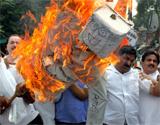
Hyderabad, September 16: Demanding rollback of the fuel price hike and FDI in retail, senior BJP leader M Venkaiah Naidu today said the party would launch a "political war" against it.
The UPA government has failed on all fronts and mid-term polls are the only solution for the country, Naidu told reporters here.
Accusing the UPA government of not taking into confidence even its allies for allowing FDI investment in multibrand retail and hike in diesel price, the BJP leader said the party would chalk-out a detailed programme of "political war" soon.
The central government led by Congress has taken the decision to cover up its failure and divert attention of people, he alleged.
Terming the FDI investment in retail as a "unilateral decision", Naidu said the UPA government has failed to keep its promise made in Parliament.
On December 7 last year, the then Finance Minister Pranab Mukherjee had informed the Lok Sabha that the decision to permit 51 per cent FDI in multibrand retail trade was suspended till a consensus was developed through consultation amongst various stakeholders including state chief ministers, he said.
The announcement was made without consulting opposition parties, traders and chief ministers of the states, he alleged.
Replying to a query, Naidu said BJP is not opposed to reforms but against FDI in retail trade and such a decision would throw crores of farmers on streets.
Reiterating party's demand for cancellation of coal blocks allocation, Naidu demanded a high-level independent inquiry in it.
A nationwide agitation programme against the UPA government's anti-poor and anti-farmer policies would be chalked out during the party's three-day national executive meeting to be held at Faridabad from September 26, he said.





Comments
Add new comment